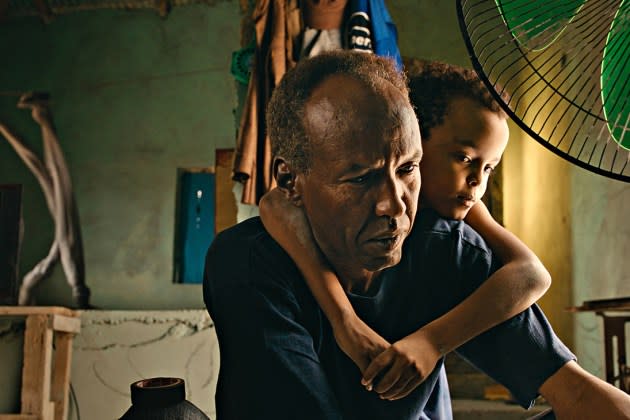‘The Village Next to Paradise’ Review: Somali Family Drama Doubles as a Potent Portrait of Life in the Shadow of War

Mo Harawe’s debut feature The Village Next to Paradise is a haunting offering. The film, which premiered at Cannes in the Un Certain Regard section and is the first Somali film to ever screen on the Croisette, presents a compelling narrative of one family’s survival in a sleepy Somali town. But it’s the devastating backdrop against which their drama plays out that lingers long after the credits roll.
The siren wails of drones soundtrack each scene of Harawe’s film, which opens with footage of a real-life report of a United States drone strike on Somalia. Since the U.S. began using drones in the East African country in the early 2000s, Somalis have suffered at the hands of an enveloping and ravenous counterterrorism operation. According to data from the New America foundation, there have been more than 300 documented uses of drones resulting in hundreds of known civilian deaths.
More from The Hollywood Reporter
The fatal impact of contemporary warfare organizes life in Paradise village, a locale whose name seems more melancholic with time. Marmargade (Ahmed Ali Farah), a principal character in Harawe’s languorous film, makes money doing odd jobs, but one of his most lucrative gigs involves burying the dead. Some of the people for whom he finds a place in the sandy terrain died of natural causes, but many of them are victims of foreign airstrikes. When this business slows, Marmargade reluctantly smuggles a truck full of goods — the contents of which play a pivotal role later — to a nearby city.
Because Marmargade knows the realities of living in a place shrouded by the shadow of death, he strives for a better life for his son Cigaal (Ahmed Mohamud Saleban), a buoyant kid who thinks nothing of the constant buzzing coming from the sky. When the local school cancels classes for the year because of chronic absenteeism among the teachers, Marmargade works to send Cigaal to a school in the city, where safety is more than an illusion. But Cigaal doesn’t want to leave his family, friends or his life in the village. When Marmargade proposes this new life to him, the child rejects the idea.
The main narrative of The Village Next to Paradise revolves around the conflicting desires within this makeshift family. Marmargade lives with his sister Araweelo (Anab Ahmed Ibrahim), a recently divorced woman who wants to build her own tailoring shop. The two have the kind of fractious relationship resulting from years of mistrust. She thinks her brother should be honest with Cigaal instead of trying to trick the young one into going to school. Marmargade wants his sister’s financial support more than her advice. After she refuses to lend him the money for tuition, Marmargade makes a series of decisions that threatens all their livelihoods.
Harawe’s film contains many admirable elements. With its unhurried pacing and tender focus on a single family, The Village Next to Paradise recalls Gabriel Martins’ 2022 feature Mars One. And the way Harawe structures the film around a broader geopolitical conflict resembles the role the Chadian civil war played in Mahamet Saleh Haroun’s 2010 film A Screaming Man, which also premiered at Cannes. The cinematography (by Mostafa El Kashef) offers truly striking images that conjure up the ghostly atmosphere of this village without turning its people into caricatures for a Western gaze hungry for a particular kind of poverty porn.
But The Village Next to Paradise is also hobbled in places by its meandering narrative and occasionally wooden performances from Harawe’s cast of local nonprofessional actors. The sharpness of Harawe’s vision is dulled by a story that takes one too many detours before settling into itself. Characters with dubious relevance are introduced and then dropped, while ones who come to play crucial roles don’t get an appropriate amount of screen time.
The film becomes more dynamic in its latter half, when Marmargade’s desperation leads him to questionable decisions that clash with Araweelo’s desires. Indeed, it’s also during these parts of the film that Harawe pulls the strongest performances from his actors, who otherwise struggle to shake off an understandable stiffness.
Despite these flaws, Harawe’s film does have a real staying power. The Village Next to Paradise orients itself around a quiet optimism and surprising humor that mirror real life. There are moments throughout that serve as a reminder that even in places where death feels close, hope for tomorrow is still alive.
Best of The Hollywood Reporter